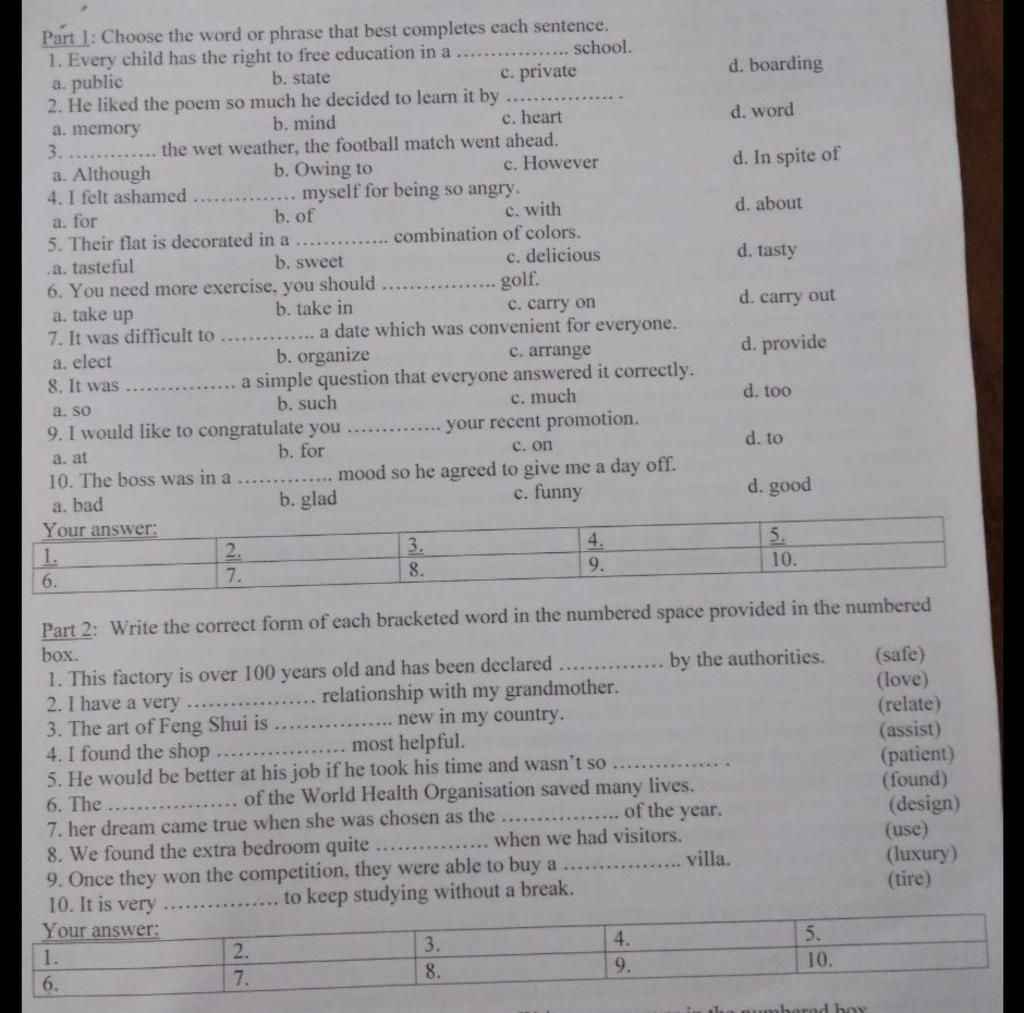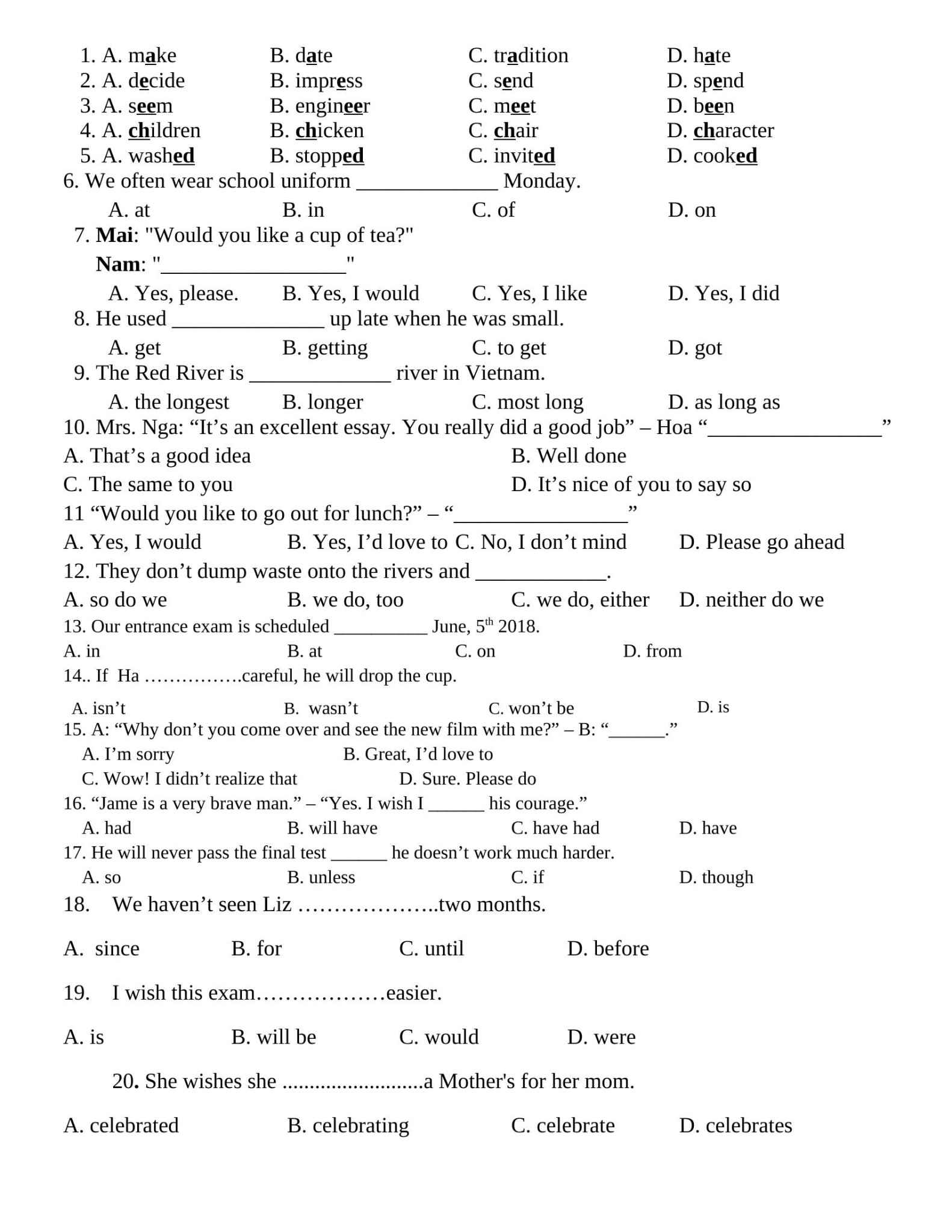TEST 6
Các câu hỏi tương tự
Viết 1 đoạn văn tiếng anh khoảng 150 từ kể về 1 bộ phim hoặc 1 câu chuyện kinh dị mà mik đã từng đọc hay xem
Mik đang cần gấp
Mong các bạn giúp đỡ
Part 1
1. Nam does a lot of homework every day.
- A lot of homework
2. Me.Tan gave me a ticket to the concert
- I
3. Shes just sold the house at the end of the road
- The house
4. You have to finish thia work on time.
- This work
5. Have you decorated your house recently ?
- Has you house
6. My parents moved to this city when I was 10
- My parents have
7. The last time I ate fish was 5 years ago
- I havent
8. The hasnt seen her husband for years
- It has been
9....
Đọc tiếp
Part 1
1. Nam does a lot of homework every day.
-> A lot of homework
2. Me.Tan gave me a ticket to the concert
-> I
3. She's just sold the house at the end of the road
-> The house
4. You have to finish thia work on time.
-> This work
5. Have you decorated your house recently ?
-> Has you house
6. My parents moved to this city when I was 10
-> My parents have
7. The last time I ate fish was 5 years ago
-> I haven't
8. The hasn't seen her husband for years
-> It has been
9. People advised us not to go out alone
-> We
10. He hasn't been back to his village for over 20 years.
-> It is
Part 2
1. We can find water here
-> Water
2. What a pity! I am not able to go on a trip with you
3. It's a pity ! She is absent from the party
-> I wish
4. I haven't seen her for three years
-> The last time
5. I graduated from university in 1990
-> I haven't been
6. How long is it since you left school?
-> When
7. I like to walk in the rain
-> I enjoy
8. Minh often reads newspaper in the morning , doesn't he ?
-> Does Minh
9. They are expectimg to see their son again
-> They are looking
10. They made jean cloth completely from cotton in the 18th century
-> Jean cloth
Hoàn thành câu :
1 We/grateful/you/take/interest/us
2 You/sure/her child/disappeared ?
3. No one/sorry/our manager/resigned
4. Every body/not surprised/they/divorce
5.I/disappoited/you/not/see/me/yesterday
6.We/thankful/she/not tell/truth
7.Children/exited/go/zoo/last SUnday
8.We amuse/you/love/him
9. I/glad/they/come/here
10.I/proud/my team/win/the first award of the competion
Chọn từ cho thích hợp :
Children don't understand my _______objects are dangerous. ( house/home/household/work)
Giúp mik nhé
I have Learned, often the hard way, that there are a few simple rules about how to make life easier both before and after your journey. First of All, always check and double-check departure times. It is amazing how few people really do this carefully. Once i arrived at the airport a few minutes after ten. My secretary had got the ticket for me and i thought she said that the plane left at 10:50. I walked calmly to the departure desk, thinking I still had a little time to spare. I d...
Đọc tiếp
Giúp mik nhé
I have Learned, often the hard way, that there are a few simple rules about how to make life easier both before and after your journey. First of All, always check and double-check departure times. It is amazing how few people really do this carefully. Once i arrived at the airport a few minutes after ten. My secretary had got the ticket for me and i thought she said that the plane left at 10:50. I walked calmly to the departure desk, thinking I still had a little time to spare. I didn`t bother to take a good look at the ticket. The clerk at the desk told me politely but firmly that the departure time was 10:15 and that the flight was, according to international regulations, " now closed! ". I had to wait three hours for the next one and missed an importent meeting.
The second rule is to remember that even in this age of credit cards, it is still importent to have at least a little of the local currency with you when you arrive in a country. This can be absolutely essential if you are flying to a place few tourists normally visit. A few years ago, I took a business trip to Oklahoma. I flew there from London via Dallas,with very little time to change planes in between. I arrived there at midnight and the bank at the airport was closed. The only way to get to my hotel was by taxi and since I had no Dollars, i offered to pay in Pounds instead." Listen, Buddy! I only take Real money! " the driver said angrily. Luckily I was able to borrow a few dollars from a clerk at the hotel, but it was Embarrassing.
The third and last rule is to find out as much as you can about the weather at your destination before you leave, especially if you can take only a little baggage with you. I feel sorry for some of my colleagues who travel in heavy suits and raincoats in May, when it is still fairly cool in London or Manchester, to places like Athens, Rome or Madrid, where it is already beginning to get quite warm during a day. Few people understand just how importent it is to have the right sort of clothes with you in these days of rapid air travel.
I. Discuss these questions. Campare your answers.
1. Explain why the writer once arrived at the airport only a few minutes before the plane left.
2. Whose fault do you think it was? Thư writer's or his secretary's? Give reasons for your answer.
3. Explain why the writer think it is essential to have at least a little local currency when you arrive in a foreign country.
4. Describe some of the problems you could have if you ignore the advice in the last paragraph
1.Remember/ post/ letter/ me/ when/you/ post office. 2. He/ insist/ invite/ mother-in law/ restaurant. 3. Many people/ rather travel/ car/ by plane/ 4. Her father/ play football/ good/ when/ younger. 5. I / be / pleased / hear / that / you / your family / well.

















